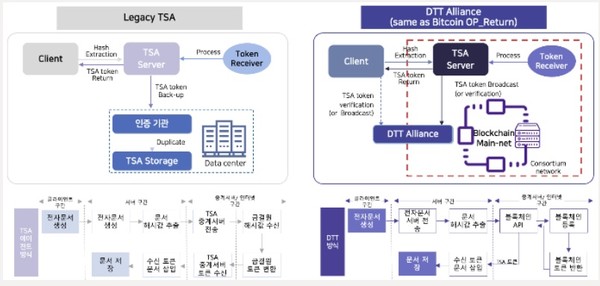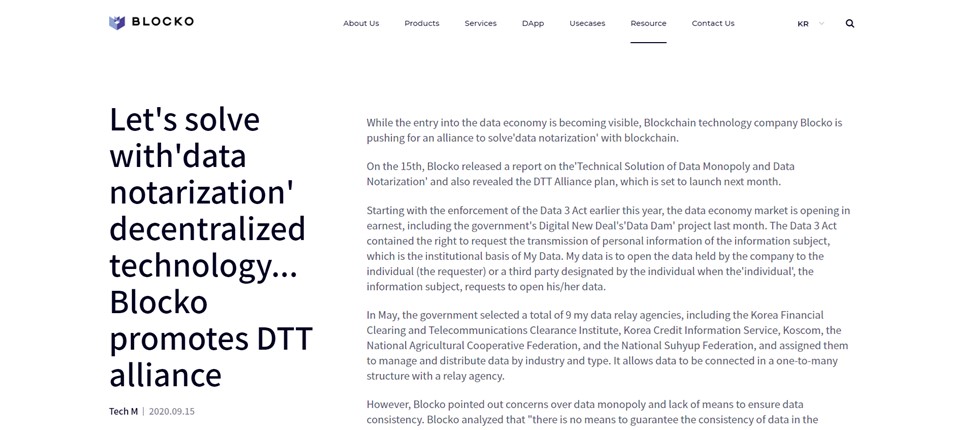While the entry into the data economy is becoming visible, Blockchain technology company Blocko is pushing for an alliance to solve’data notarization’ with blockchain.
On the 15th, Blocko released a report on the’Technical Solution of Data Monopoly and Data Notarization’ and also revealed the DTT Alliance plan, which is set to launch next month.
Starting with the enforcement of the Data 3 Act earlier this year, the data economy market is opening in earnest, including the government’s Digital New Deal’s’Data Dam’ project last month. The Data 3 Act contained the right to request the transmission of personal information of the information subject, which is the institutional basis of My Data. My data is to open the data held by the company to the individual (the requester) or a third party designated by the individual when the’individual’, the information subject, requests to open his/her data.
In May, the government selected a total of 9 data relay agencies, including the Korea Financial Clearing and Telecommunications Clearance Institute, Korea Credit Information Service, Koscom, the National Agricultural Cooperative Federation, and the National Suhyup Federation, and assigned them to manage and distribute data by industry and type. It allows data to be connected in a one-to-many structure with a relay agency.
However, Blocko pointed out concerns over data monopoly and lack of means to ensure data consistency. Blocko analyzed that “there is no means to guarantee the consistency of data in the process of circulating accumulated and processed data, so there is a situation where there is also a concern about the gap between processing, distribution, and utilization of data from the accumulation stage.” “In order to utilize data, it is essential to ensure that data is used properly, as well as its source and consistency in all processes from accumulation to distribution.”
Blocko expressed concern over the government’s’data dam’ project to create innovative services by collecting and standardizing data generated through public and private networks. In particular, the establishment of a big data platform and center is considered to be the core business of the data dam, and it aims to establish 5 platforms and 50 additional centers that collect, analyze, and distribute data in various fields.
The report pointed out that “(data dam business) does not deal with the contents of tracking the consistency or forgery of data circulating through the platform and center, and data change and use.”
Blocko cited’data exchange’ as an example. The report said, “Most of the data files transacted in the data exchange are distributed in the form of general files (csv, json) that are easy to edit, so it is impossible to follow-up tracking how the data is transformed and used.” “Even though high-level data such as the based movement route is being distributed, the consistency of the data or follow-up tracking has not been achieved.”

Accordingly, Blocko uses’Decentralized Trusted Timestamping (DTT)’ technology to help notarize data, and to do so, promote alliances with related companies and institutions.
DTT is a’decentralized TSA’ technology that replaces the existing centralized Time Stamping Authority (TSA) with blockchain technology. TSA is a method in which a’time stamp’ is created on a specific electronic document and registered in the blockchain. The meaning of the timestamp being created means that when, by whom, and in what form a specific electronic document was created is encrypted and recorded on the blockchain. DTT is to solve this process in a decentralized way.
Bloco CEO Won-beom Kim said, “In the process of collecting, distributing, and utilizing a large number of data, it is necessary to think about how to guarantee the reliability of data and check future usage. As a method of’notarization’, we propose a DTT Alliance to check the source of data and whether it is forged or altered.”
The’DTT Alliance’ is a consortium for’distributed’ TSA services that replace the TSA storage method. It is to solve data notarization by allowing companies agreed through the DTT Alliance to form a consortium blockchain to prove and distribute data. This alliance is currently with domestic and overseas leading cloud and SI companies, and is set to launch in October.
